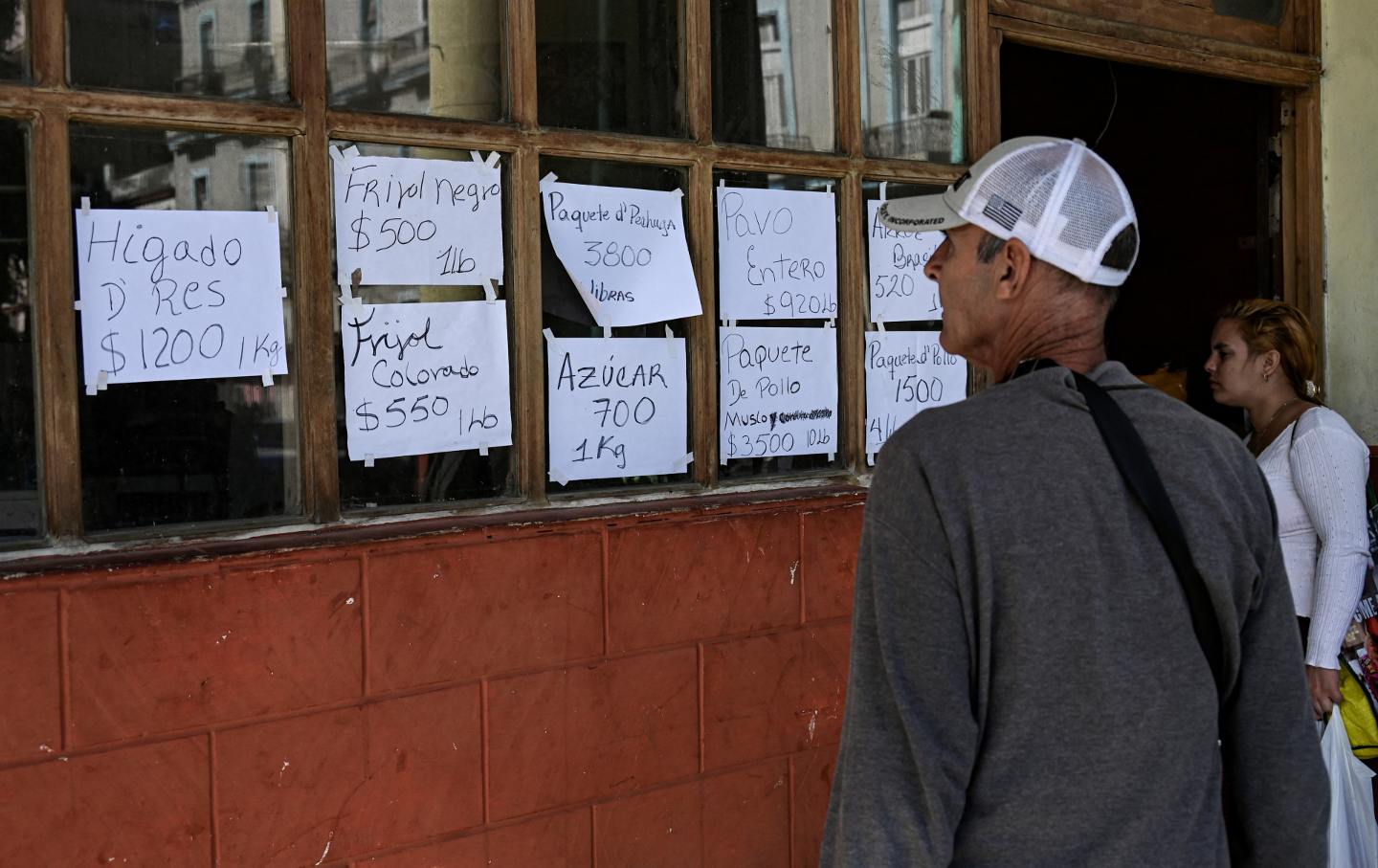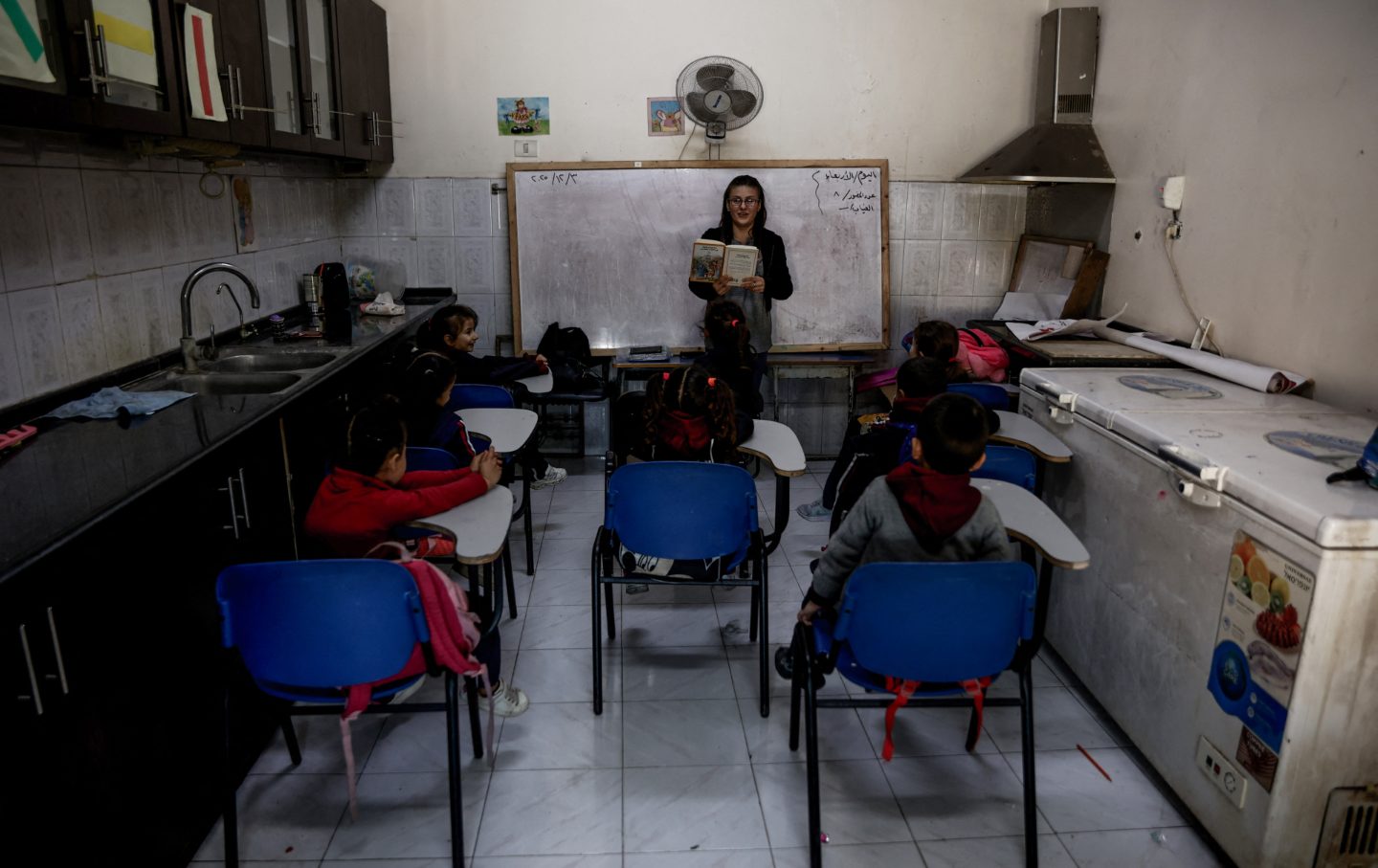Cuba’s Humanitarian Crisis
US policy is exacerbating the growing crisis.

Nine years ago, on December 17, 2014, jubilation swept through the city of Havana when Presidents Barack Obama and Raúl Castro announced that they would normalize US-Cuban relations, after 55 years of hostility. Church bells rang, cars honked their horns, and people hugged each other in the streets. Today, the mood in the city is one of desperation. The economy is spiraling downward, and US policy is exacerbating the growing humanitarian crisis.
President Donald Trump’s tough economic sanctions drastically reduced Cuba’s foreign exchange earnings, and President Joe Biden has left most of those sanctions in place. The Covid-19 pandemic closed the tourism industry, the central pillar of the economy, and it has yet to recover. These two massive external shocks struck an economy already vulnerable as it tries to navigate a transition from Soviet-style central planning to market socialism. A 2021 attempt at exchange rate reform unleashed double-digit inflation, impoverishing everyone living on a salary paid in Cuba pesos. The average monthly salary is about 4,200 pesos. In 2021, that was worth $162 US; today, it is worth just $16 on the informal market.
The impact of the economic crisis is visible everywhere. There are fewer cars on the streets and long lines at gas stations because of the fuel shortage. Tourist hotels stand half-empty and the once bustling streets of Old Havana are quiet. The shelves in state stores are mostly bare, often lacking even the limited basket of goods that Cubans receive at subsidized prices on their ration book. Garbage is accumulating on street corners. Street crime is rising.
But the misery is not equally distributed. Ever since the economic crisis of the 1990s after the Soviet Union collapsed, Cubans with access to foreign exchange currency through remittances or as part of their salaries have had a cushion against hardship. Today, because of inflation, the gap between haves and have-nots is wider and more visible than ever.
The rapid growth of small and medium private enterprises in the past two years, a key element of the economic reform program to boost domestic production, has aggravated inequality. Some entrepreneurs, operating on shoestring budgets in a hostile regulatory environment have nevertheless been highly successful. In just the past year, private retail grocery stores have appeared, selling food imported with their own capital. The stores are not especially well-stocked, but they offer far more than state stores. The prices, however, are way beyond the reach of most Cubans. One in Havana is selling butter for $8 US per pound. For Cubans who have dollars, the shortages are tolerable. For those who do not, finding enough food is getting harder and harder.
As living conditions deteriorate, many Cubans, especially well-educated young people, are losing hope in the future. The high expectations people had in 2014 for rapprochement with the United States and for relief from US sanctions have been dashed. So have expectations that the new generation of Cuban leaders led by President Miguel Díaz-Canel would push through dramatic economic changes. The result is unprecedented mass migration. Since 2022, 442,000 undocumented Cubans have arrived at US borders, more than 50,000 have come as legal immigrants, and tens of thousands more have emigrated elsewhere. Cuba is hemorrhaging its young, best-educated people. Migration is also a blow to the domestic economy. Last year, more than 12,000 doctors left. In Havana alone, there are 17,000 vacant teachers positions. Even Cubans earning good salaries working for foreign diplomatic missions and international organizations are leaving because they cannot envision a future for themselves in their homeland.
Cuban migrants are adding to the crisis on the US southern border, exacerbating Biden’s main political vulnerability, yet the administration refuses to budge on its sanctions policy. In Central America, Washington recognizes that reducing the flow of migrants requires improving living conditions in their home countries. US policy toward Cuba is designed to worsen living conditions. It’s working, but the people bearing the burden are everyday Cubans, not senior government or party officials.
The humanitarian situation on the island cries out for a US response. Washington has offered Cuba humanitarian aid before. In 2008, in response to the devastation caused by Hurricane Gustav, George W. Bush’s administration offered Cuba $6.3 million of aid, $5 million directly to the Cuban government without preconditions. Just last year, the Biden administration provided $2 million in the wake of Hurricane Ian to help rebuild housing in the hardest hit communities.
The need is far greater today. President Biden could take four simple steps to help ease the crisis: (1) Take Cuba off the State Department’s terrorism list, which would facilitate international trade and banking for both the state and private sectors, and would open the way for Europeans to resume visiting Cuba without losing visa-free access to the United States; (2) encourage international organizations like the Pan American Health Organization, the UN Food and Agriculture Organization, and UNICEF to increase their assistance; (3) collaborate with our European Union allies to offer direct assistance in the form of food and medical supplies to help the most vulnerable; and (4) finalize the modest package of supports for the Cuban private sector announced months ago but since delayed for political reasons. These steps will not end Cuba’s humanitarian crisis, but they would help.
Reflecting on the prospects for a change in US policy as the 2024 presidential campaign gets underway, a skeptical European diplomat asked me, “What’s in it for Biden?” Honestly, not much. At best, it might marginally reduce the number of migrants on the southern border and mollify progressive Democrats deserting Biden in droves over his seemingly unconditional support for Israel’s war in Gaza.
But the human suffering being endured by millions of Cubans demands a principled response. There are moments, John F. Kennedy wrote in Profiles in Courage, when politicians must choose between doing what’s politically expedient and doing what’s right. Joe Biden is known for his genuine empathy for others. Right now, he is focused on the acute humanitarian crisis in Gaza and the interminable war in Ukraine. But if the responsible senior officials in the State Department and National Security Council put Cuba on the president’s agenda and briefed him on the depth of the crisis there, maybe he would do the right thing.
Disobey authoritarians, support The Nation
Over the past year you’ve read Nation writers like Elie Mystal, Kaveh Akbar, John Nichols, Joan Walsh, Bryce Covert, Dave Zirin, Jeet Heer, Michael T. Klare, Katha Pollitt, Amy Littlefield, Gregg Gonsalves, and Sasha Abramsky take on the Trump family’s corruption, set the record straight about Robert F. Kennedy Jr.’s catastrophic Make America Healthy Again movement, survey the fallout and human cost of the DOGE wrecking ball, anticipate the Supreme Court’s dangerous antidemocratic rulings, and amplify successful tactics of resistance on the streets and in Congress.
We publish these stories because when members of our communities are being abducted, household debt is climbing, and AI data centers are causing water and electricity shortages, we have a duty as journalists to do all we can to inform the public.
In 2026, our aim is to do more than ever before—but we need your support to make that happen.
Through December 31, a generous donor will match all donations up to $75,000. That means that your contribution will be doubled, dollar for dollar. If we hit the full match, we’ll be starting 2026 with $150,000 to invest in the stories that impact real people’s lives—the kinds of stories that billionaire-owned, corporate-backed outlets aren’t covering.
With your support, our team will publish major stories that the president and his allies won’t want you to read. We’ll cover the emerging military-tech industrial complex and matters of war, peace, and surveillance, as well as the affordability crisis, hunger, housing, healthcare, the environment, attacks on reproductive rights, and much more. At the same time, we’ll imagine alternatives to Trumpian rule and uplift efforts to create a better world, here and now.
While your gift has twice the impact, I’m asking you to support The Nation with a donation today. You’ll empower the journalists, editors, and fact-checkers best equipped to hold this authoritarian administration to account.
I hope you won’t miss this moment—donate to The Nation today.
Onward,
Katrina vanden Heuvel
Editor and publisher, The Nation








